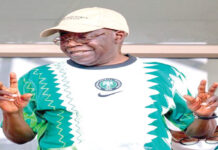By Guillem Balague
Spanish football writer
(BBC)
Unai Emery says Arsenal are making “a good decision” by appointing Mikel Arteta to replace him as manager.
Emery, 48, was sacked last month after an 18-month spell in charge ended with a seven-game winless run.
“He really is prepared to make that next jump,” said Emery.
“He has been at Arsenal before, he’s been in the Premier League and he has been working with Pep Guardiola. I do believe this is a good decision and I would also like it to be a good decision.”
In his first broadcast interview since leaving Arsenal, Spaniard Emery spoke to BBC Sport’s Guillem Balague on a range of topics, including plans to give him a new contract earlier this season, the manner of his Emirates exit, his relationship with Mesut Ozil and interest from Everton.
How it all unravelled – ‘We swam up the shore and died on the beach’
The truth is that in the first year I was very pleased and the only thing left for me to do was to put the rubber stamp on the season with a win in the final of the Europa League. In the knockout stages we looked powerful.
And then we played in the final against Chelsea where we had a great first half in a tactical sense, and where, in my opinion, we could have taken control of the game. But Eden Hazard separated both sides in their favour and they won the match.
And in the league we swam right up to the shore and died on the beach.
We effectively lost a top-four finish at home in two games, a draw against Brighton and a loss to Crystal Palace. These happened at a time when we were heavily involved in the Europa League.
There were things that happened that impeded our chances of responding as well as we would have wanted, such as the injuries to Rob Holding, Hector Bellerin and Aaron Ramsey.
But it’s true that I was very satisfied with how things went because I believe we learned how to become a team, at times a team that shone, but a team that was effective and competitive, and a team that in general was showing why Arsenal signed me. I believe we achieved that and we just needed to make that final step.
From talk of a new contract to the sack in a matter of weeks
This season, theoretically, we also began well and I had the feeling – and so did the club – that the achievements of the previous season were valued and we were now looking to how we could develop together, even to the point where they were looking to offer a renewed contract.
Then I remember we had one month… At one of the international breaks we were third, and then in the first game after we came back, the frustrations from bad results were beginning to make us worse for the following matches. We were losing confidence, and it’s also true to say we were losing a bit of stability.
The game against Sheffield United [a 1-0 win for the Blades in October] was a turning point. In one month everything got broken, and we were incapable of winning a game in seven and the tension based on the question we were asking “What’s happening to us” was like a rolling ball that was just getting bigger and bigger.
When that happens the coach is the first person to come into the spotlight. I have lived this at other clubs but I have managed to conquer it by getting the team back on track, but at Arsenal that month was terrible.
‘People could see me suffering – my situation had become unsustainable’
I had friends or people at my side who would say to me, “I can see you’re suffering,” and I said “naturally”.
When a coach doesn’t win, he suffers. And when he doesn’t win two, or three or four he suffers more. We had to win to regain our emotional equilibrium, to get rid of that frustration and we couldn’t.
And what is true is the social mass of Arsenal, which is very big, couldn’t see it, couldn’t connect with what was happening and it is true that in this situation, as happens in every country and with every team, the coach finds himself targeted.
I spoke to the players three or four weeks before the process began to tell them that things were not going well and that I couldn’t see the team I pictured on the field of play, I couldn’t identify what I was looking for. We looked for solutions but results still didn’t come.
The club made its decision and that was passed on to me by Raul Sanllehi (Arsenal’s head of football) with much regret because he also felt his share of the responsibility and we were very united… but the situation had become unsustainable as regards to the protests of a section of the fans.
That said, I believe there was another important section who believed we could have been shown more patience and carried on with the project. I think we could have turned things around but I also understand those at the top have to take decisions and take responsibility.
Was the language barrier a major problem?
The language barrier becomes bigger in people’s eyes, because of the results. I think if the results had been good things would have gone like the previous season – people would have allowed me to make mistakes, and found my English more acceptable than focusing on my mistakes.
I had a certain level of English simply because I hadn’t had the opportunity to develop it more – Id had two years in France with Paris St-German where I concentrated much more on French.
So when I arrived in England the first thing I said to myself is “I have to speak English” and the club not only helped me but also encouraged me to speak English even with all the difficulties, which is why I made that effort.
I have always made this effort from my first press conference, I always spoke to the players in English and I believe progressively I am speaking it better. Communication in football is very important and it has been one of the basic foundations of my success in Spain and France.
Obviously I don’t know how far I’ve got, whether it’s at 40% or 50%, I still had a way to go. When the results are not good you have to answer more questions but always on the same line.
Consequently my speech in the first or the second question of press conferences could contain phrases or words to express myself but the third or the fourth or the fifth I found more difficult. As a result I saw this barrier that I had to conquer and I believe that in time I would have done it but clearly I still had a long way to go.
I had conversations with players of 20 minutes or half an hour, practically every week. Individually as well. And when I finished the conversation I went to the delegate of the team and asked if the message had been understood. I wanted to see if the message had gone through, and he always told me “Unai, logically there are things that could be better, but everything is understood”.
Was making Xhaka captain a mistake?
The main captains last year were Laurent Koscielny, Petr Cech, Aaron Ramsey and Nacho Monreal and they all left the team. So the natural leader in the changing room, because of his values and what he represented, was Granit Xhaka.
There was a vote to see if what I felt about him was also felt by the players. And it was.
Circumstances meant Xhaka had a clash with fans [he was booed off the pitch when being substituted during October’s home draw with Crystal Palace], but he is the leader that this team needs then and now, because of the values he represents, because of the respect everyone had for him and because of his experience.
A difficult relationship with Ozil?
I’ve had a lot of conversations with Mesut Ozil. He’s a very important player for the team. There are games in which you see Mesut’s brilliance, linking with the attack. But also I had to find players around him so he felt comfortable.
Also the team needed to feel solid. And when you, little by little, have to build a team that is aggressive, intense, as well as structured for good pressure, we also had to find a space for Mesut as he gives us an important part of the game, which is his brilliant talent.
To do so I had to find the right connections between players; the right tactics. I was very motivated to try to find that. I wanted Alexandre Lacazette, Pierre-Emerick Aubameyang and Mesut to work together, each one of them with their own characteristics.
But there were times when I had to leave one of them out of the XI.
Ozil is a very important player if you can find a way to make it work with other players. He has talent that allows other players to be better, but when you want a bit more aggressive pressure he does not have the best qualities for that.
Interest from Everton – and what next?
Now is the time to go home. To be with my people, to analyse a lot. I’ll spend the next few days close to my family, with my coaches. And I’ve started doing a lot of soul searching.
We all spoke to each other and questioned what we got wrong. There’s been interest from teams but I want to just spend some quiet time and choose the right project.
Different teams have expressed interest. To be honest I want to thank them [Everton and others] for wanting me and I told them that I wanted to be quiet, that I need to take a little bit of air. And to choose well the next project after many years of not stopping.
For the moment it is time to rest. That will be good for my mind. To regroup ideas and to analyse mistakes that we may have made. To talk to people around me to ask them what they saw in what I did. I need time for all that. Personally I need to recover energy to start strong the next thing that I will lead.
And I want to take advantage of this conversation to thank Arsenal for the opportunity they gave me to live these moments with them. One bad month will not take that away.










